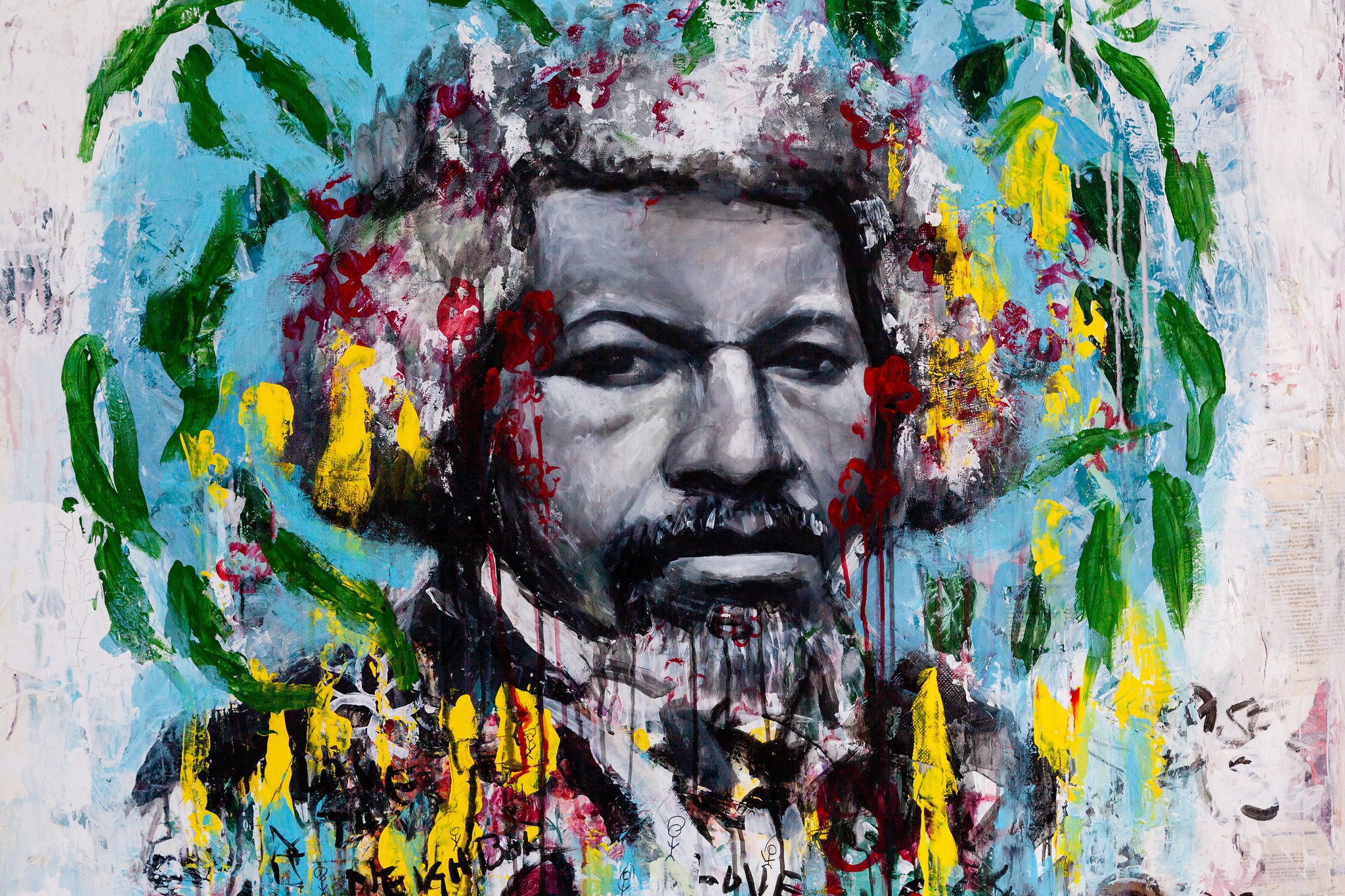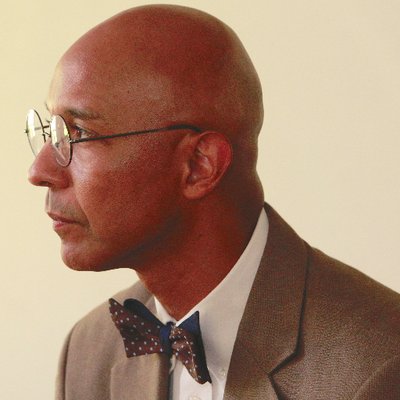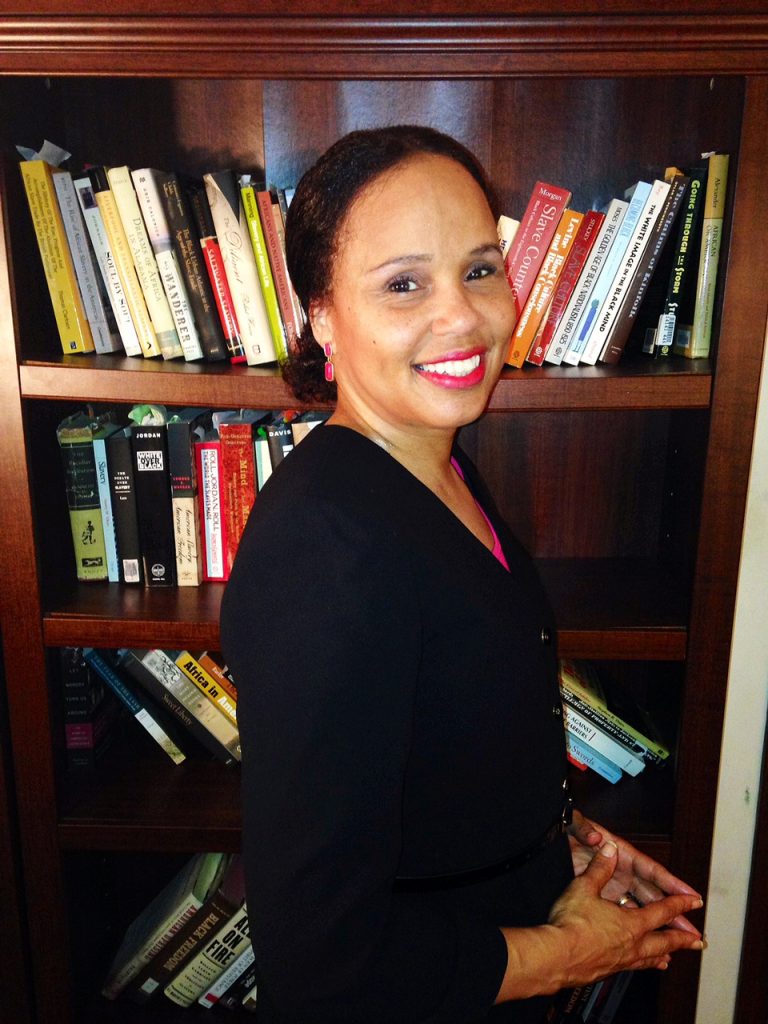Online Forum: The Futures of Frederick Douglass

April 22-26, 2019
Black Perspectives, the award-winning blog of the African American Intellectual History Society (AAIHS), is hosting an online forum on innovative approaches to the study of Frederick Douglass (1818-1895). Each of the essays presented here argues for a reexamination of Douglass, one arising from the need to challenge Douglass’s self-constructed legacy through depictions of him as a man who relied on and drew strength from the different affinities and networks he chose to enter throughout his life. Organized by Hélène Quanquin (Université de Lille), Cécile Roudeau (Université Paris Diderot), and Michaël Roy (Université Paris Nanterre), this forum emerged from a three-day conference in Paris entitled, “Frederick Douglass Across and Against Times, Places, and Disciplines,” that was planned and coordinated by the forum organizers as well as Claire Bourhis-Mariotti, Agnès Derail, Hélène Le Dantec-Lowry, and Claire Parfait. We will be featuring contributions from Douglas Egerton (Le Moyne College), Brigitte Fielder (University of Wisconsin-Madison), P. Gabrielle Foreman (University of Delaware), Ezra Greenspan (Southern Methodist University), Ronald Angelo Johnson (Texas State University), Robert Levine (University of Maryland), and Kay Wright Lewis (Howard University).
The forum begins on Monday, April 22, 2019 and concludes on Friday, April 26. During the week of the online forum, Black Perspectives will publish new blog posts every day at 5:30AM EST. Please follow Black Perspectives (@BlkPerspectives) and AAIHS (@AAIHS) on Twitter; like AAIHS on Facebook; or subscribe to our blog for updates. By subscribing to Black Perspectives, each new post will automatically be delivered to your inbox during the week of the forum.
About the Organizers
Hélène Quanquin is Professor of American Studies at Université de Lille, where she teaches American history. Her research focuses on nineteenth-century American reform movements and their intersections. She is the author of contributions on male feminists such as Wendell Phillips and Thomas Wentworth Higginson, and the American women’s rights movement (Revue Française d’Etudes Américaines, Epistolaire, University of Rochester Press, Louisiana State University Press). She is the co-editor of several books and journal issues, among which Refaire l’Amérique: Imaginaire et histoire aux Etats-Unis (Paris: Presses de la Sorbonne Nouvelle, 2011) and “Critical Masculinities” (special issue of Culture, Society & Masculinities, Vol. 3, N°1, Summer 2011). She has been the recipient of fellowships from the Massachusetts Historical Society, the Schlesinger Library, the Sophia Smith Collection and the American Antiquarian Society. She was visiting associate professor at Brown University in 2008 and at the University of Texas at Austin in 2014. Her book entitled Men in the American Women’s Rights Movement: Cumbersome Allies (Routledge) will be published in 2020. Follow her on Twitter @HQuanquin.
***
 Cécile Roudeau is Senior Researcher at Université Paris Diderot and currently a visiting scholar at The Center for Advanced Study in the Behavioral Sciences at Stanford University. Roudeau started her career as a specialist of New England regionalism and women’s writing. Her first book (Presses Universitaires Paris Sorbonne, 2012) revisits the notion of “place” in New England regionalist writing, and argues that “taking place” was as much a political and epistemic claim as a spatial experience. She is currently working on a book project titled Beyond Stateless Literature: Practices of Democratic Power in Nineteenth-Century US Letters. This new project builds on a growing body of empirical and theoretical work on the state (in sociology, political science, and history) that reconsiders the articulation between democracy and the state away from the presumptive opposition between the two. Roudeau’s project builds on this revisionist trend and proposes that contra the interpretations of early to mid-nineteenth century American literature as a literature against the state, the state was not avoided at all by nineteenth-century writers and critics. Building on a pragmatic methodology, the book is not so much interested in the imaginary of statecraft as in forms of (literary) practice. Because it engages female writers alongside male canonical writers, it will extend the ongoing research on the democratic state into realms such as domesticity and gender politics. Follow her on Twitter @cecileroudeau1.
Cécile Roudeau is Senior Researcher at Université Paris Diderot and currently a visiting scholar at The Center for Advanced Study in the Behavioral Sciences at Stanford University. Roudeau started her career as a specialist of New England regionalism and women’s writing. Her first book (Presses Universitaires Paris Sorbonne, 2012) revisits the notion of “place” in New England regionalist writing, and argues that “taking place” was as much a political and epistemic claim as a spatial experience. She is currently working on a book project titled Beyond Stateless Literature: Practices of Democratic Power in Nineteenth-Century US Letters. This new project builds on a growing body of empirical and theoretical work on the state (in sociology, political science, and history) that reconsiders the articulation between democracy and the state away from the presumptive opposition between the two. Roudeau’s project builds on this revisionist trend and proposes that contra the interpretations of early to mid-nineteenth century American literature as a literature against the state, the state was not avoided at all by nineteenth-century writers and critics. Building on a pragmatic methodology, the book is not so much interested in the imaginary of statecraft as in forms of (literary) practice. Because it engages female writers alongside male canonical writers, it will extend the ongoing research on the democratic state into realms such as domesticity and gender politics. Follow her on Twitter @cecileroudeau1.
***
 Michaël Roy is Associate Professor of American Studies at Université Paris Nanterre, France. He is the author of Textes fugitifs. Le récit d’esclave au prisme de l’histoire du livre (Fugitive Texts: Slave Narratives in Antebellum Print Culture, 2017), which investigates the publication, circulation, and reception of antebellum slave narratives, and the co-editor of Undoing Slavery: American Abolitionism in Transnational Perspective, 1776-1865 (2018). He has published several essays on slave narratives and the American abolition movement in various academic journals, including “Cheap Editions, Little Books, and Handsome Duodecimos: A Book History Approach to Antebellum Slave Narratives” (MELUS: Multi-Ethnic Literature of the United States, 2015), “The Vanishing Slave: Publishing the Narrative of Charles Ball, from Slavery in the United States (1836) to Fifty Years in Chains (1858)” (Papers of the Bibliographical Society of America, 2017) and “‘Throwing pearls before swine’: The Strange Publication History of Vie de Frédéric Douglass, esclave américain (1848)” (Slavery & Abolition, 2019). He has also published a French translation of The Confessions of Nat Turner (2017). Follow him on Twitter @mroyUPN.
Michaël Roy is Associate Professor of American Studies at Université Paris Nanterre, France. He is the author of Textes fugitifs. Le récit d’esclave au prisme de l’histoire du livre (Fugitive Texts: Slave Narratives in Antebellum Print Culture, 2017), which investigates the publication, circulation, and reception of antebellum slave narratives, and the co-editor of Undoing Slavery: American Abolitionism in Transnational Perspective, 1776-1865 (2018). He has published several essays on slave narratives and the American abolition movement in various academic journals, including “Cheap Editions, Little Books, and Handsome Duodecimos: A Book History Approach to Antebellum Slave Narratives” (MELUS: Multi-Ethnic Literature of the United States, 2015), “The Vanishing Slave: Publishing the Narrative of Charles Ball, from Slavery in the United States (1836) to Fifty Years in Chains (1858)” (Papers of the Bibliographical Society of America, 2017) and “‘Throwing pearls before swine’: The Strange Publication History of Vie de Frédéric Douglass, esclave américain (1848)” (Slavery & Abolition, 2019). He has also published a French translation of The Confessions of Nat Turner (2017). Follow him on Twitter @mroyUPN.
About the Participants
 Douglas Egerton is Professor of History at LeMoyne College. He earned his PhD in History at Georgetown University. His work deals with the intersections between race and politics in early America. His books include Thunder At the Gates: The Black Civil War Regiments That Redeemed America (Basic Books, 2016), The Wars of Reconstruction: The Brief, Violent History of America’s Most Progressive Era (Bloomsbury, 2014), Year of Meteors: Stephen Douglas, Abraham Lincoln, and the Election That Brought on the Civil War (Bloomsbury, 2010), and Death or Liberty: African Americans and Revolutionary America (Oxford University Press, 2009). His first book, Charles Fenton Mercer and the Trial of National Conservatism (University Press of Mississippi, 1989), examined the career of the founder of the American Colonization Society, a group of conservative white antislavery politicians who wished to send freed slaves to Liberia. His other books, Gabriel’s Rebellion (UNC Press, 1993), He Shall Go Out Free: The Lives of Denmark Vesey (Rowman & Littlefield, 1999), and Rebels, Reformers and Revolutionaries (Routledge, 2002) explore slave rebelliousness.
Douglas Egerton is Professor of History at LeMoyne College. He earned his PhD in History at Georgetown University. His work deals with the intersections between race and politics in early America. His books include Thunder At the Gates: The Black Civil War Regiments That Redeemed America (Basic Books, 2016), The Wars of Reconstruction: The Brief, Violent History of America’s Most Progressive Era (Bloomsbury, 2014), Year of Meteors: Stephen Douglas, Abraham Lincoln, and the Election That Brought on the Civil War (Bloomsbury, 2010), and Death or Liberty: African Americans and Revolutionary America (Oxford University Press, 2009). His first book, Charles Fenton Mercer and the Trial of National Conservatism (University Press of Mississippi, 1989), examined the career of the founder of the American Colonization Society, a group of conservative white antislavery politicians who wished to send freed slaves to Liberia. His other books, Gabriel’s Rebellion (UNC Press, 1993), He Shall Go Out Free: The Lives of Denmark Vesey (Rowman & Littlefield, 1999), and Rebels, Reformers and Revolutionaries (Routledge, 2002) explore slave rebelliousness.
 Brigitte Fielder is an Assistant Professor in the Department of Comparative Literature at the University of Wisconsin-Madison, where she is also affiliated with the departments of Gender and Women’s Studies and Afro-American Studies. She received her Ph.D. in English with a minor in Feminist, Gender, and Sexuality Studies from Cornell University. She is the author of Relative Races: Genealogies of Interracial Kinship in Nineteenth-Century America, forthcoming from Duke University Press. Professor Fielder has held research fellowships from the American Antiquarian Society and the Animal Studies Institute – Wesleyan University Animal Studies program. From 2014-2016, she was a member of the Executive Committee of C19: the Society of Nineteenth-Century Americanists and currently serves on the society’s Advisory Board. She also sits on the Editorial Board of Tulsa Studies in Women’s Literature. In 2017-2018 she held the Nellie Y. McKay Fellowship, an award that honors McKay’s pathbreaking life and career as a woman of color scholar who laid foundations for the study of African American literature. Follow her on Twitter @BrigField.
Brigitte Fielder is an Assistant Professor in the Department of Comparative Literature at the University of Wisconsin-Madison, where she is also affiliated with the departments of Gender and Women’s Studies and Afro-American Studies. She received her Ph.D. in English with a minor in Feminist, Gender, and Sexuality Studies from Cornell University. She is the author of Relative Races: Genealogies of Interracial Kinship in Nineteenth-Century America, forthcoming from Duke University Press. Professor Fielder has held research fellowships from the American Antiquarian Society and the Animal Studies Institute – Wesleyan University Animal Studies program. From 2014-2016, she was a member of the Executive Committee of C19: the Society of Nineteenth-Century Americanists and currently serves on the society’s Advisory Board. She also sits on the Editorial Board of Tulsa Studies in Women’s Literature. In 2017-2018 she held the Nellie Y. McKay Fellowship, an award that honors McKay’s pathbreaking life and career as a woman of color scholar who laid foundations for the study of African American literature. Follow her on Twitter @BrigField.
 P. Gabrielle Foreman is Professor of African American Studies at the University of Delaware. She is an award-winning teacher and scholar who has published extensively on issues of race, slavery and reform with a focus on the past’s continuing hold on the world we inhabit today. She is the author of several widely known books and editions including Activist Sentiments: Reading Black Women Writers as well as a score of highly-regarded articles and book chapters. She is known for her collaborative work including a Penguin Classics edition of Harriet Wilson’s Our Nig: Or, Sketches from the Life of a Free Black in which she and her co-editor “managed to pick up one of the coldest trails in nineteenth-century African American studies.” The radio tour that followed reached millions of listeners. At University of Delaware, Foreman has collaborated on dance/poetry performance pieces based on her research on Wilson as well as on David Drake, or “Dave the Potter,” Frances Harper and the Colored Conventions. Her current project is entitled The Art of DisMemory: Historicizing Slavery in Poetry, Performance and Material Culture. She is the Ned B. Allen Professor of English with appointments in History and Africana Studies and is a Senior Library Research Fellow. She is the founding faculty director of the prize-winning and NEH supported Colored Conventions Projects. She and CCP co-founders, UD graduate students Jim Casey and Sarah Patterson, are co-editing the forthcoming volume, Colored Conventions in the Nineteenth Century and the Digital Age. Follow her on Twitter @profgabrielle.
P. Gabrielle Foreman is Professor of African American Studies at the University of Delaware. She is an award-winning teacher and scholar who has published extensively on issues of race, slavery and reform with a focus on the past’s continuing hold on the world we inhabit today. She is the author of several widely known books and editions including Activist Sentiments: Reading Black Women Writers as well as a score of highly-regarded articles and book chapters. She is known for her collaborative work including a Penguin Classics edition of Harriet Wilson’s Our Nig: Or, Sketches from the Life of a Free Black in which she and her co-editor “managed to pick up one of the coldest trails in nineteenth-century African American studies.” The radio tour that followed reached millions of listeners. At University of Delaware, Foreman has collaborated on dance/poetry performance pieces based on her research on Wilson as well as on David Drake, or “Dave the Potter,” Frances Harper and the Colored Conventions. Her current project is entitled The Art of DisMemory: Historicizing Slavery in Poetry, Performance and Material Culture. She is the Ned B. Allen Professor of English with appointments in History and Africana Studies and is a Senior Library Research Fellow. She is the founding faculty director of the prize-winning and NEH supported Colored Conventions Projects. She and CCP co-founders, UD graduate students Jim Casey and Sarah Patterson, are co-editing the forthcoming volume, Colored Conventions in the Nineteenth Century and the Digital Age. Follow her on Twitter @profgabrielle.
 Ezra Greenspan is Professor of English and the Edmund J. and Louise W. Kahn Chair in Humanities at Southern Methodist University. He is a literary and cultural historian who studies and teaches the history of written communications and media in the United States—from manuscript and print to digitalia. His interests include the history of writing, printing, and publishing; of institutions of letters such as libraries and schools; of the interplay between letters and visual images; of archives and archiving; and of the historic uses of written communications, especially by ethnic groups such as African Americans and Jews. Those interests underlie his practice of writing biography. His most recent books are George Palmer Putnam: Representative American Publisher (2000) and William Wells Brown: An African-American Life (2014) which provided comprehensive biographies of the publisher G. P. Putnam and of the writer-activist William Wells Brown. His current project is a multigenerational family biography to be called The Lives and Times of Frederick Douglass and His Family: A Composite Biography.
Ezra Greenspan is Professor of English and the Edmund J. and Louise W. Kahn Chair in Humanities at Southern Methodist University. He is a literary and cultural historian who studies and teaches the history of written communications and media in the United States—from manuscript and print to digitalia. His interests include the history of writing, printing, and publishing; of institutions of letters such as libraries and schools; of the interplay between letters and visual images; of archives and archiving; and of the historic uses of written communications, especially by ethnic groups such as African Americans and Jews. Those interests underlie his practice of writing biography. His most recent books are George Palmer Putnam: Representative American Publisher (2000) and William Wells Brown: An African-American Life (2014) which provided comprehensive biographies of the publisher G. P. Putnam and of the writer-activist William Wells Brown. His current project is a multigenerational family biography to be called The Lives and Times of Frederick Douglass and His Family: A Composite Biography.
 Ronald Angelo Johnson is Associate Professor of History at Texas State University. He is a historian of the early United States. His specializations are diplomacy, religion, and the Atlantic World. Of particular emphasis are early U.S. foreign relations, immigration, the African Diaspora, and cultural encounters. His first book, Diplomacy in Black and White: John Adams, Toussaint Louverture, and Their Atlantic World Alliance (University of Georgia Press, 2014), analyzes early U.S. diplomacy against the backdrop of Atlantic world revolutions and American slavery. The book tells a story of Americans and Haitians circumventing domestic and international mores of intercultural relations. He is currently writing his second book, Racialized Diplomacy and the Haitian Diaspora in the Early American Republic. This work explores how the ideals of the Declaration of Independence created the foundation of early American diplomacy and informed subsequent Atlantic revolutions. It examines the diplomatic and cultural connections between the western Atlantic world’s first two nation-states. Combining materials from Caribbean and European archives with a wide range of U.S. printed and manuscript sources, Revolutionary Relations is the first study to identify 18th and early 19th-century migrants from Haiti as an immigrant group and to measure their contributions to early American society. Follow him on Twitter @RonAJohnson.
Ronald Angelo Johnson is Associate Professor of History at Texas State University. He is a historian of the early United States. His specializations are diplomacy, religion, and the Atlantic World. Of particular emphasis are early U.S. foreign relations, immigration, the African Diaspora, and cultural encounters. His first book, Diplomacy in Black and White: John Adams, Toussaint Louverture, and Their Atlantic World Alliance (University of Georgia Press, 2014), analyzes early U.S. diplomacy against the backdrop of Atlantic world revolutions and American slavery. The book tells a story of Americans and Haitians circumventing domestic and international mores of intercultural relations. He is currently writing his second book, Racialized Diplomacy and the Haitian Diaspora in the Early American Republic. This work explores how the ideals of the Declaration of Independence created the foundation of early American diplomacy and informed subsequent Atlantic revolutions. It examines the diplomatic and cultural connections between the western Atlantic world’s first two nation-states. Combining materials from Caribbean and European archives with a wide range of U.S. printed and manuscript sources, Revolutionary Relations is the first study to identify 18th and early 19th-century migrants from Haiti as an immigrant group and to measure their contributions to early American society. Follow him on Twitter @RonAJohnson.
 Robert Levine is a Distinguished University Professor of English at the University of Maryland. He has been an influential force in American and African American literature for over thirty years, and more recently has contributed important work to the burgeoning field of hemispheric and transnational American literary studies. His prominent publications cover an array of themes critical to an understanding of 19th-century American literature. His most recent book is The Lives of Frederick Douglass (Harvard University Press, 2016). He has also published Conspiracy and Romance: Studies in Brockden Brown, Cooper, Hawthorne, and Melville (Cambridge University Press, 1989), Martin Delany, Frederick Douglass, and the Politics of Representative Identity (University of North Carolina Press, 1997), and Dislocating Race and Nation: Episodes in Nineteenth-Century American Literary Nationalism (University of North Carolina Press, 2008). His most recent monograph is Race, Transnationalism, and Nineteenth-Century American Literary Studies (Cambridge University Press, 2018). In addition to his critical books, Levine’s scholarly editions of Melville, Hawthorne, Martin Delany, Douglass, James Whitfield, William Wells Brown, and Harriet Beecher Stowe have helped to make available both canonical and lesser known works to wider audiences.
Robert Levine is a Distinguished University Professor of English at the University of Maryland. He has been an influential force in American and African American literature for over thirty years, and more recently has contributed important work to the burgeoning field of hemispheric and transnational American literary studies. His prominent publications cover an array of themes critical to an understanding of 19th-century American literature. His most recent book is The Lives of Frederick Douglass (Harvard University Press, 2016). He has also published Conspiracy and Romance: Studies in Brockden Brown, Cooper, Hawthorne, and Melville (Cambridge University Press, 1989), Martin Delany, Frederick Douglass, and the Politics of Representative Identity (University of North Carolina Press, 1997), and Dislocating Race and Nation: Episodes in Nineteenth-Century American Literary Nationalism (University of North Carolina Press, 2008). His most recent monograph is Race, Transnationalism, and Nineteenth-Century American Literary Studies (Cambridge University Press, 2018). In addition to his critical books, Levine’s scholarly editions of Melville, Hawthorne, Martin Delany, Douglass, James Whitfield, William Wells Brown, and Harriet Beecher Stowe have helped to make available both canonical and lesser known works to wider audiences.
 Kay Wright Lewis is an Assistant Professor of History at Howard University. Her research focuses on slavery and abolition, African American intellectual history, Atlantic World history, and the history of violence. Lewis’ book, published by the University of Georgia Press, is entitled A Curse Upon the Nation: Race, Freedom, and Extermination in America and the Atlantic World (University of Georgia Press, 2019). This study examines how ideas about black and white extermination in a war between the races influenced the development of slavery and precluded the acceptance of black freedom in America. As a graduate student, Lewis held an Andrew W. Mellon Competitive Dissertation Fellowship at Rutgers University. After graduation, she was a Fellow at the Gilder Lehrman Center at Yale University in 2011, and Lewis’ dissertation was one of the finalists in the Southern Historical Association’s C. Vann Woodward Dissertation Prize competition. She has presented at many national and international conferences, has taught at Rutgers University, Adelphi University, Fairleigh Dickinson University, and Norfolk State University. Lewis has also written five essays that were published in the Encylopedia of African American Life. Follow her on Twitter @KayWrightLewis1.
Kay Wright Lewis is an Assistant Professor of History at Howard University. Her research focuses on slavery and abolition, African American intellectual history, Atlantic World history, and the history of violence. Lewis’ book, published by the University of Georgia Press, is entitled A Curse Upon the Nation: Race, Freedom, and Extermination in America and the Atlantic World (University of Georgia Press, 2019). This study examines how ideas about black and white extermination in a war between the races influenced the development of slavery and precluded the acceptance of black freedom in America. As a graduate student, Lewis held an Andrew W. Mellon Competitive Dissertation Fellowship at Rutgers University. After graduation, she was a Fellow at the Gilder Lehrman Center at Yale University in 2011, and Lewis’ dissertation was one of the finalists in the Southern Historical Association’s C. Vann Woodward Dissertation Prize competition. She has presented at many national and international conferences, has taught at Rutgers University, Adelphi University, Fairleigh Dickinson University, and Norfolk State University. Lewis has also written five essays that were published in the Encylopedia of African American Life. Follow her on Twitter @KayWrightLewis1.

